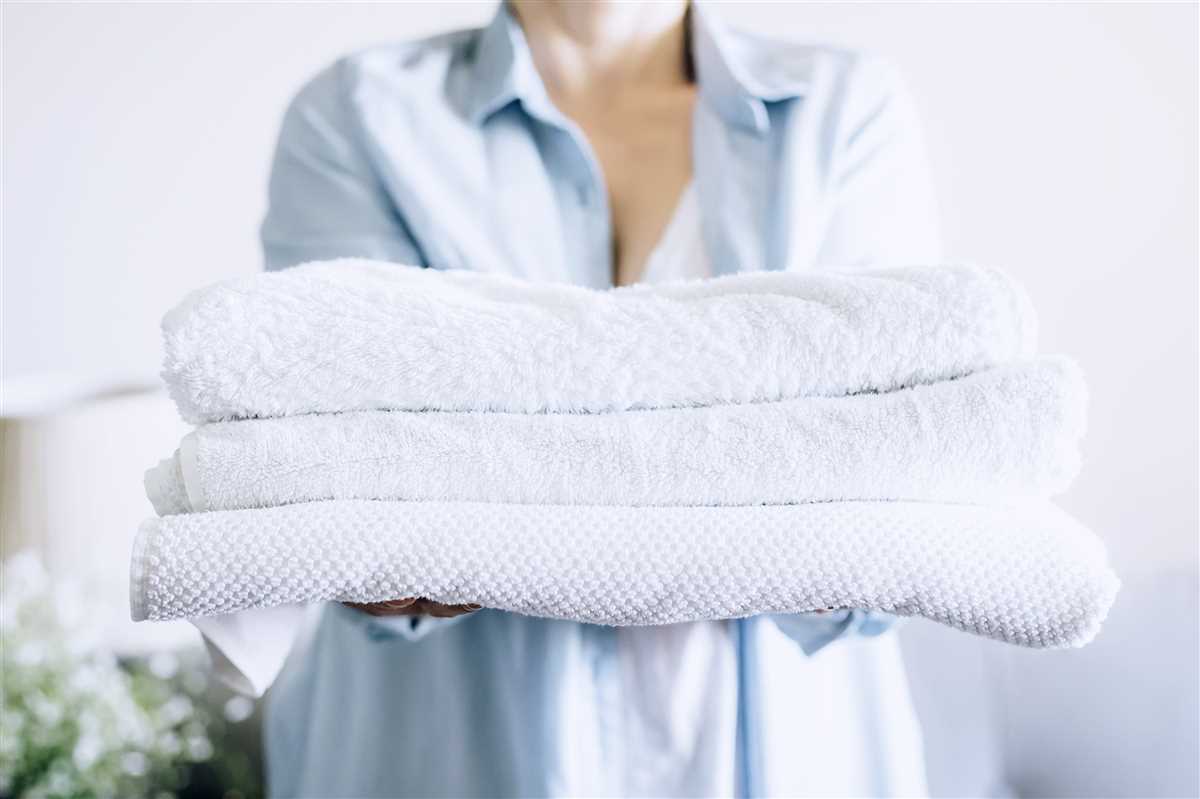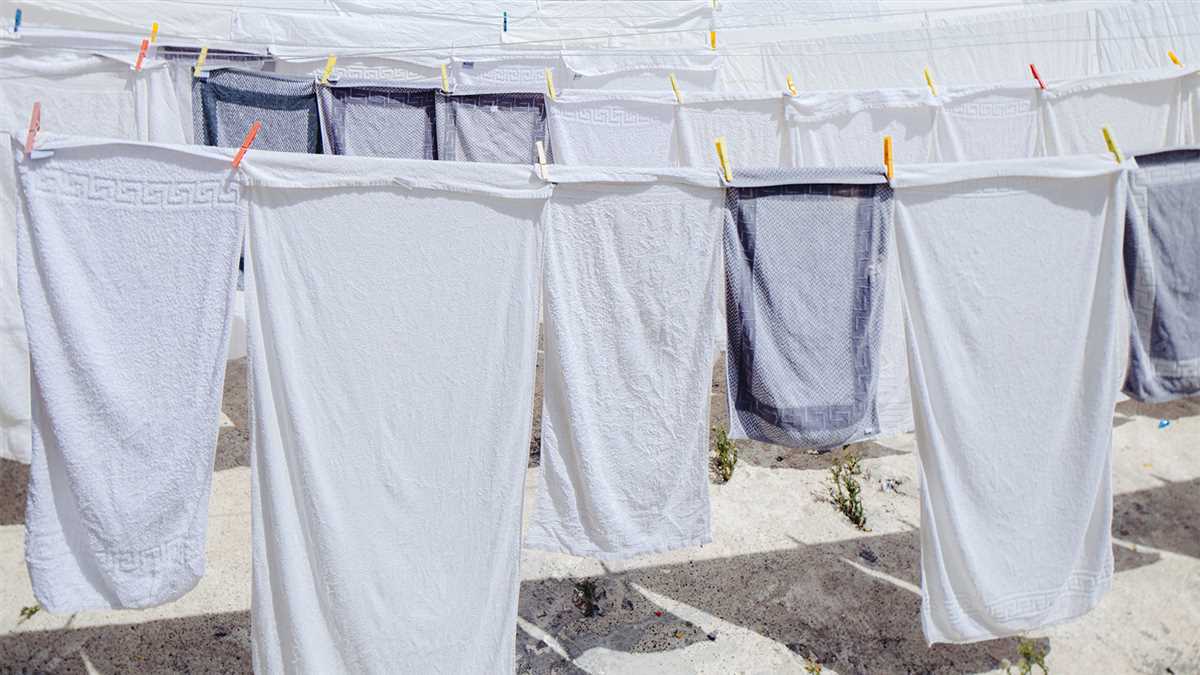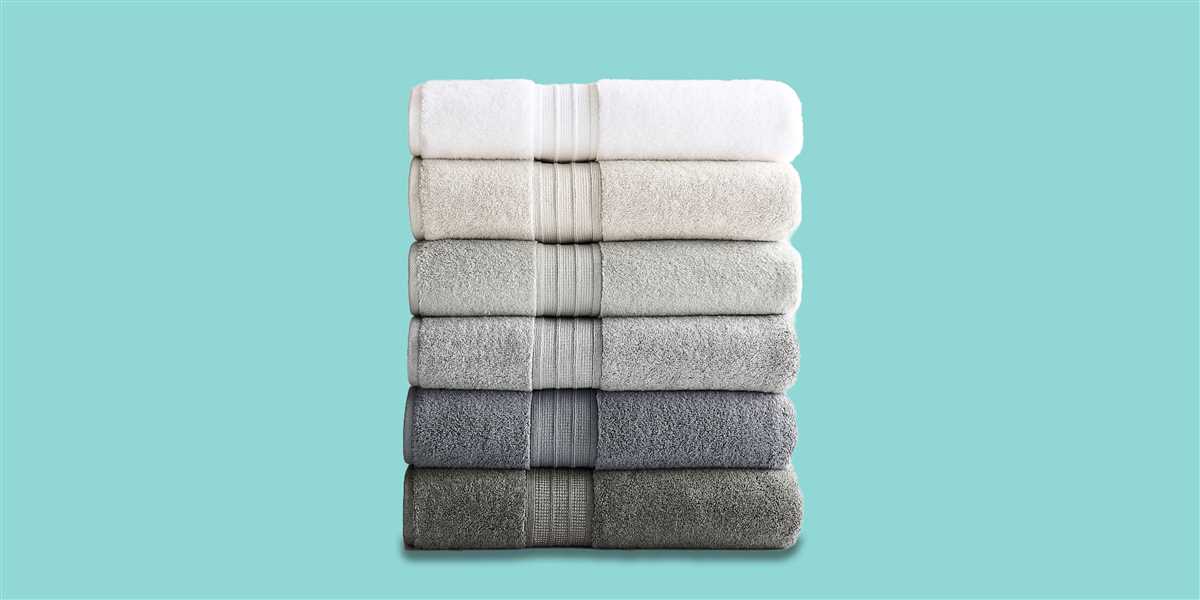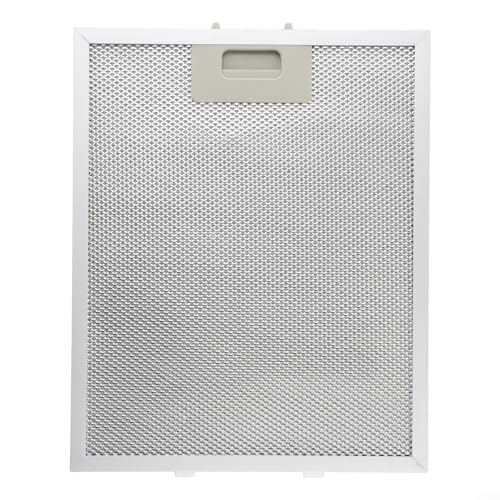




The feeling of a soft and fluffy towel against your skin is a simple pleasure in life. However, have you ever noticed that sometimes after air drying your towels outside, they become stiff and rough? You may be wondering why this happens and what you can do to prevent it.
The main reason towels become hard when air dried outside is due to the evaporation process. When you hang your towel outside, the water within the fabric starts to evaporate. As the water evaporates, it leaves behind mineral deposits, such as calcium and magnesium, on the fibers of the towel. These mineral deposits create a residue, which causes the towel to feel stiff and rough to the touch.
Furthermore, the exposure to the sun and wind can also contribute to the hardness of your towels. The UV rays from the sun can break down the fibers of the towel, leading to a loss of softness. Additionally, the wind can cause friction between the towel fibers, causing them to become more compact and less fluffy.
To prevent your towels from becoming hard when air dried outside, there are a few simple steps you can take. Firstly, consider using a water softener in your washing machine to reduce the amount of mineral deposits in your towels. Secondly, use a fabric conditioner during the wash cycle to help maintain the softness of the fibers. Finally, if possible, avoid hanging your towels directly in the sun, as this can accelerate the breakdown of the fibers.
Why Towels Become Hard When Air Dried Outside
Have you ever noticed that towels tend to become hard and stiff when they are air dried outside? This phenomenon happens due to a few key factors.
Absorption and Evaporation

Towels are designed to absorb water and moisture, which is why they feel soft and fluffy when they are first used. However, when towels are left to air dry outside, the moisture in the fabric evaporates too quickly. This rapid evaporation causes the remaining water molecules to be drawn to the surface, leaving the towel feeling stiff and rough.
Exposure to Sunlight and Wind
Another contributing factor is the exposure to sunlight and wind. Sunlight can cause the fibers in towels to break down and become more brittle over time. Wind, on the other hand, can blow away the natural oils and moisture present in the fabric, further contributing to the hardening effect.
Mineral Deposits
When towels are air dried outside, they are often exposed to various mineral deposits present in the air, such as calcium and magnesium. These minerals can cling to the fibers of the towel and create a residue that makes the fabric feel rough and stiff.
Tips for Softening Air Dried Towels

If you prefer air drying your towels outside but want to prevent them from becoming hard, there are a few tips you can try:
- Shake the towel vigorously before hanging it to dry. This helps to loosen the fibers and prevent them from becoming too stiff.
- Consider drying your towels in a shaded area or indoors away from direct sunlight. This can help to slow down the evaporation process and prevent the towels from becoming overly stiff.
- Adding a small amount of fabric softener or vinegar to the final rinse cycle can help to restore some softness to air dried towels.
- Alternatively, you can tumble dry your towels on a low heat setting for a short period after they have air dried outside. This can help to restore some fluffiness and softness to the fabric.
By understanding the reasons why towels become hard when air dried outside, you can take steps to prevent this from happening and keep your towels feeling soft and luxurious.
The Effects of Sunlight on Towels
Sunlight can have both positive and negative effects on towels when they are air dried outside. While sunlight is often thought to be beneficial for drying fabrics, it can also cause certain changes in towels that result in them becoming hard or stiff.
Fading Colors
One of the primary effects of sunlight on towels is that it can cause the colors to fade. The UV rays in sunlight can break down the dyes used in towels, causing them to lose their vibrancy over time. This is particularly noticeable in towels that are regularly exposed to direct sunlight for long periods.
Loss of Softness
Sunlight can also have an impact on the softness of towels. The heat from the sun can cause the fibers in towels to become stiff and rough. Over time, this can result in towels feeling less luxurious and comfortable against the skin.
Decreased Absorbency
Exposure to sunlight can also reduce the absorbency of towels. The heat and UV rays can damage the fibers in towels, making them less effective at absorbing water. This can result in towels feeling damp or not drying as effectively as they should.
Preventing Sun Damage
To prevent sun damage and keep towels soft and absorbent, it is recommended to avoid extended exposure to direct sunlight. Instead, air drying towels in shaded areas can help minimize the effects of sunlight. Additionally, using fabric softeners and avoiding excessive detergent can also help maintain the softness and absorbency of towels.
| Effect | Description |
|---|---|
| Fading Colors | Sunlight can cause the colors of towels to fade over time. |
| Loss of Softness | The heat from the sun can make towels stiff and rough. |
| Decreased Absorbency | Towels exposed to sunlight may become less effective at absorbing water. |
Evaporation and Absorption: Key Factors
When towels are air dried outside, two key factors come into play that can cause them to become hard. These factors are evaporation and absorption.
Evaporation
Evaporation is the process by which water molecules in the towel turn into vapor and escape into the surrounding air. When towels are hung outside, the heat from the sun and the wind help to speed up the evaporation process.
As the water molecules evaporate, they leave behind minerals and other substances that were dissolved in the water. These substances can build up on the surface of the towel, making it feel stiff and rough.
If towels are not fully dried before being taken inside, the remaining water molecules can continue to evaporate in a less favorable environment, such as a cooler indoor space. This can further contribute to the hardness of the towel.
Absorption
Another factor that can contribute to towels becoming hard when air dried outside is absorption. When towels are exposed to the outdoor environment, they can absorb dust, pollen, and other particles from the air. These particles can penetrate the fibers of the towel, making it feel stiff and less soft to the touch.
In addition to particles from the air, towels can also absorb minerals and substances from the surfaces on which they are placed, such as grass, sand, or concrete. These absorbed substances can also contribute to the hardness of the towel.
To prevent towels from becoming hard when air dried outside, it is important to ensure that they are fully dried before bringing them inside. This can be done by allowing them to dry in a warm and well-ventilated area, or by using a tumble dryer on a low heat setting.
Regular washing and using fabric softeners can also help to keep towels soft and prevent them from becoming hard when air dried outside.
The Role of Humidity in Towel Drying
When air drying towels outside, it’s not uncommon for them to become hard instead of the soft and fluffy texture we desire. One of the main factors contributing to this change in texture is humidity.
What is humidity?
Humidity refers to the amount of moisture present in the air. It can vary depending on various factors such as temperature, air pressure, and location. Humidity is typically measured as a percentage, with higher percentages indicating more moisture in the air.
How does humidity affect towel drying?
The drying process of a towel involves the evaporation of water from its fibers. When towels are air dried outside, they are exposed to the surrounding environment, including the humidity levels present. High humidity can significantly impact the drying process and result in towels becoming hard.
When the humidity levels in the air are high, it means that there is already a significant amount of moisture present. This can slow down the evaporation process, making it difficult for towels to dry efficiently. As a result, the water in the towel fibers may not completely evaporate, leading to a stiff and less absorbent texture.
How to prevent towels from becoming hard when air dried outside?
While it may be challenging to control the humidity levels in the air, there are a few tips to help prevent towels from becoming hard when air dried outside:
- Avoid drying towels on humid days: Check the weather forecast for humidity levels before deciding to air dry your towels outside. If the humidity is high, consider using a different drying method.
- Choose a dry and well-ventilated spot: Find an area with good air circulation, such as a balcony or clothesline. This can help speed up the drying process and reduce the impact of high humidity.
- Consider indoor drying: If the outdoor humidity is consistently high, consider drying your towels indoors using a fan or dehumidifier. This can help create a more controlled environment for drying.
By being mindful of humidity levels and following these tips, you can increase the chances of your towels drying properly and maintaining their soft and fluffy texture.
Minerals and Residue Buildup on Towels
Towels can become hard and stiff when air dried outside due to the accumulation of minerals and residue on the fabric. When towels are exposed to sunlight and air, water evaporates, leaving behind the dissolved minerals from the water and residues from detergents and fabric softeners.
Minerals: Water contains various minerals, such as calcium, magnesium, and iron, which can leave deposits on towels. These minerals are commonly found in hard water and can cause the fabric to become stiff and rough. As the water evaporates, the minerals are left behind and adhere to the fibers of the towel, creating a buildup over time.
Residue: Detergents and fabric softeners leave behind residues on towels, especially when they are not rinsed thoroughly. These residues can accumulate on the fibers and contribute to the hardening of the towel. Additionally, if towels are not properly dried, the residues can attract dirt and dust particles, making the buildup even more noticeable.
To prevent the buildup of minerals and residues on towels, it is important to take proper care of them. Here are a few tips:
- Use less detergent: Using excessive amounts of detergent can result in more residue buildup. Follow the manufacturer’s recommendations for the correct amount of detergent to use.
- Rinse towels thoroughly: After washing, make sure to rinse the towels thoroughly to remove any remaining detergent or fabric softener.
- Avoid fabric softeners: Fabric softeners can leave residues on towels, so it is best to skip them altogether or use them sparingly.
- Choose liquid over powdered detergent: Liquid detergents tend to rinse out more effectively, reducing the chances of residue buildup.
- Consider using vinegar: Adding a cup of white vinegar to the rinse cycle can help remove mineral deposits and residues from towels.
Note: If your towels have already become stiff and hard, you can try rewashing them with vinegar or using a product specifically designed to remove mineral buildup. Following the care instructions on the towel labels and avoiding extended exposure to direct sunlight can also help maintain their softness.
Tips for Keeping Towels Soft and Fluffy
1. Use Vinegar
One simple trick to keep your towels soft and fluffy is to add a cup of white vinegar to the rinse cycle when washing them. Vinegar helps to remove any soap residue that can make towels feel stiff and rough. It also helps to restore the natural pH balance of the towels and make them feel soft.
2. Avoid Fabric Softener
While fabric softener may seem like a good option to make your towels feel soft, it can actually have the opposite effect. Fabric softeners can leave a waxy residue on the towels, making them feel less absorbent and more prone to becoming stiff. Instead, opt for vinegar or a specialty towel softener.
3. Shake Out and Fluff
After each wash, give your towels a good shake to remove any excess lint or debris. Then, fluff them up by gently pulling and stretching the fibers. This will help to keep them soft and maintain their fluffy texture.
4. Avoid Overdrying
Overdrying towels can make them feel stiff and rough. Avoid leaving them in the dryer for too long. Instead, remove the towels from the dryer while they are still slightly damp. This will help to preserve their softness and prevent them from becoming too crispy.
5. Skip the Air Drying
While air drying towels outside may seem like a natural option, it can actually make them feel harder. The sun and wind can cause the towels to dry too quickly, which can result in a rough texture. Instead, opt for a low or medium heat setting in the dryer or hang them indoors to air dry.
6. Avoid Using Excess Detergent
Using too much detergent can leave a residue on your towels, making them feel stiff and less absorbent. Be sure to follow the recommended amount of detergent for each load, and consider using a towel-specific detergent that is designed to keep them soft and fluffy.
7. Store Properly

When storing your towels, make sure they are completely dry. Damp towels can develop a musty smell over time. Fold them neatly and place them in a dry, well-ventilated area to help maintain their softness and prevent any unpleasant odors.
8. Refresh with Baking Soda
Over time, towels can become less absorbent and lose their softness. To refresh them, add half a cup of baking soda to the wash cycle. Baking soda helps to remove any build-up and restore the absorbency of the towels, making them feel soft and fluffy again.
9. Avoid Harsh Chemicals
When washing your towels, avoid using bleach or harsh chemicals. These can damage the fibers and make the towels feel rough. Opt for a gentle, mild detergent that is suitable for delicate fabrics to keep your towels soft and in good condition.
10. Rotate Regularly
To ensure all your towels stay soft and fluffy, it’s a good idea to rotate them regularly. This will prevent any one towel from being overused and becoming worn out. By rotating your towels, you’ll ensure that they all maintain their softness and continue to provide a luxurious feel.
FAQ
Why do towels become hard when air dried outside?
Towels become hard when air dried outside because the water in the towels evaporates, leaving behind minerals and residue that harden the fabric.
Can I prevent towels from becoming hard when air dried outside?
Yes, there are a few ways to prevent towels from becoming hard when air dried outside. One way is to shake the towel vigorously before hanging it outside to remove excess moisture. Another way is to add a small amount of fabric softener to the wash cycle or use dryer sheets when drying the towel in a dryer after air drying outside. These methods can help keep the towels soft and prevent them from becoming hard.
How can I make my towels soft after air drying outside?
To make towels soft after air drying outside, you can try a few methods. One method is to soak the towel in a mixture of warm water and white vinegar for about 15 minutes before washing it. Another method is to use a fabric softener or dryer sheets when drying the towel in a dryer after air drying outside. Additionally, you can try using a towel-specific fabric softener that is designed to soften and restore the fabric. These methods can help make the towels soft and remove any hardness caused by air drying outside.
Are there any benefits to air drying towels outside despite them becoming hard?
Yes, there are benefits to air drying towels outside even though they may become hard. Air drying outside is more environmentally friendly than using a dryer, as it saves energy and reduces greenhouse gas emissions. Additionally, the sunlight can help kill bacteria and remove odors from the towels. While the towels may become hard, they can still be softened using various methods, as mentioned earlier. So, overall, air drying towels outside has its benefits despite the hardness that may occur.















